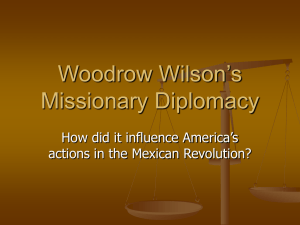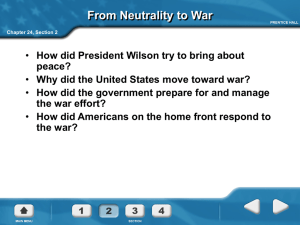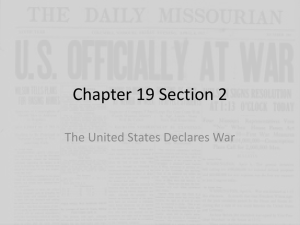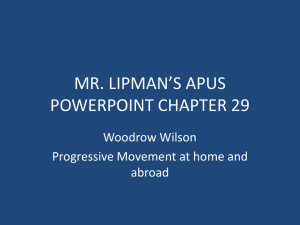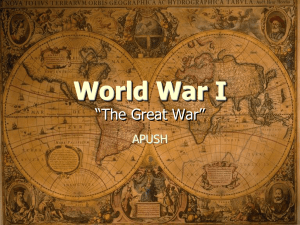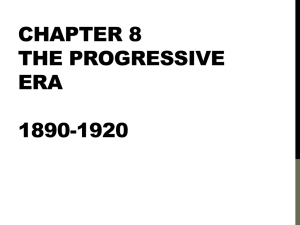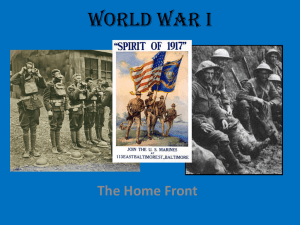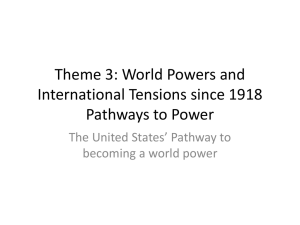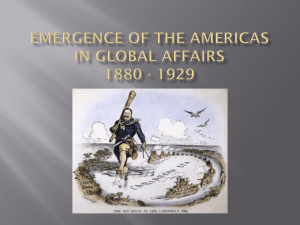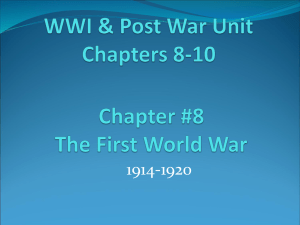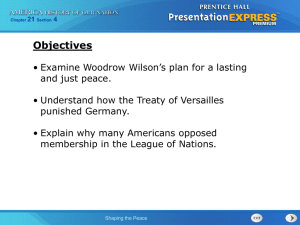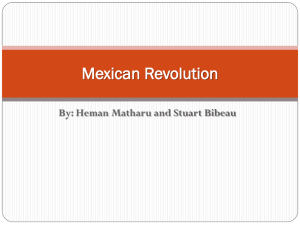Moral Diplomacy
advertisement
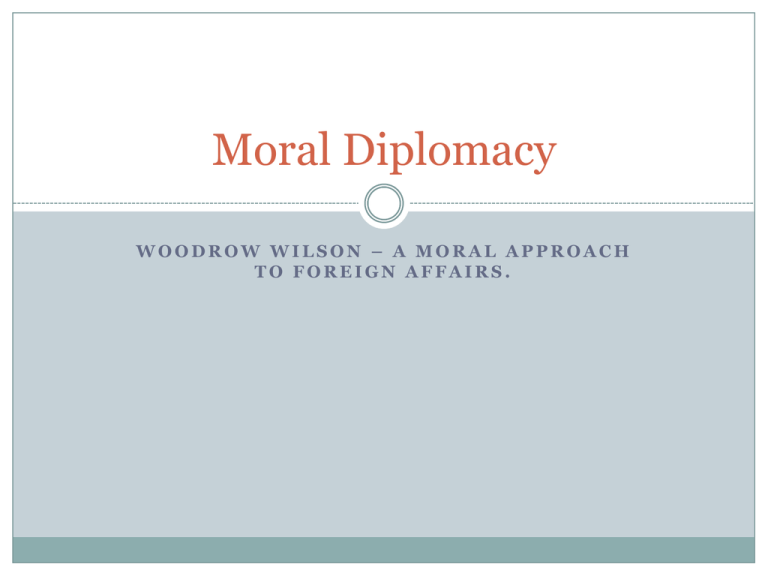
Moral Diplomacy WOODROW WILSON – A MORAL APPROACH TO FOREIGN AFFAIRS. Son of a Preacher Man “Moral” or “Missionary” Diplomacy The champion of liberal humanitarian ideals. Wilson believed with religious commitment the US had been created to serve mankind. He hated imperialism and the exploitation of helpless peoples by the strong. He believed all people should have the right to govern themselves. Wilson’s Diplomacy The US would only recognize Latin American govts founded upon law and order “not upon arbitrary or irregular force”. Wilson was willing to use military force to show Latin Americans “how to elect good men” as leaders. He hoped that American capitalism could aid the promotion of democracy which he held to be a moral duty of the US. William Jennings Bryan Secretary of State Bryan The leading opponent of imperialism. He also advocated peace through arbitration and conciliation. A new beginning in foreign policy in 1913. With Wilson’s backing, Bryan negotiated treaties with thirty nations, including GB, France and Italy, to prevent war. China Undid the $$ Diplomacy of the Taft administration. In 1913 Wilson did not approve a loan to build railways in China, as it would lead to unacceptable outside interference in Chinese affairs. May 1913 – Wilson recognized the Republic of China without consulting any of the other great powers. Japan A crisis occurred in 1913, when California deliberated a bill to forbid persons ‘ineligible to citizenship’ to own land in the state. Wilson and Bryan could not persuade the Californians to avoid this open insult to the Japanese. Japanese govt protested strongly and there was the threat of war on both sides. Japanese Crisis Wilson and Bryan’s conciliatory diplomacy defused the situation. They were willing to negotiate a treaty with Japan to guarantee the mutual right of ownership. In early 1915 the Japanese tried to force a treaty which would have made China a protectorate of Japan. Wilson strongly opposed this threat to Chinese independence the Japanese gave up their extreme demands. ‘ Do the right thing’ Panama Canal Wilson was determined to ‘do the right thing’ in international relations. In August 1912 Congress passed legislation that would exempt American ships from paying tolls for using the canal. Great Britain believed that the Panama Canal should be open on equal terms to the ships of all nations. Courageous move Wilson was convinced that the British were right. In March 1914, Wilson went before Congress and asked for repeal of the exemption provision. It was one of Wilson’s most courageous moves during his presidency. Most of the Democratic leadership opposed him but the House and Senate approved a repeal of the exemption provision. Repair the damage Wilson and Bryan wanted to ‘repair the damage done’ by Theodore Roosevelt in 1903 when he ‘took’ Panama from Columbia. The Treaty of Bogota in 1914 gave Columbia $25 million for the loss of Panama. It also expressed “sincere regret” of the US that anything happened to ruin good relations between the two countries. Damage repaired? A great power apologizing to a small country was met with approval throughout Latin America. Roosevelt’s friends in the Senate were able to block ratification. It was not until 1921 and the Harding administration who negotiated a new treaty worth $25 million but no apology. Wilson’s great goal for Latin America To unite all the American republics in an alliance. Respect one another’s territorial integrity and guarantee one another’s political independence. He hoped for a Pan-American pact which would settle all disputes among themselves by peaceful methods. This pact was ruined by Chile which had a border dispute with Peru and it would not submit to arbitration. Military Intervention? Wilson regarded defense of the Caribbean area and the Panama Canal as the main objective of US foreign policy. Wilson refused to let American business interests exploit the peoples of the area. Wilson did state that he would use any means necessary to guarantee the stability of the area. It’s for his Own Good Nicaragua Bryan continued to support a corrupt and conservative regime. Bryan-Chamorro Treaty. Not by armed intervention but by paying $3million for an option on its canal route. The govt wanted a provision to allow the US to intervene in Nicaragua to preserve order and defend independence. The anti-imperialists wanted this provision removed before they would ratify the treaty. Haiti Haiti – Military intervention “ I suppose there is nothing for it but to take the bull by the horns and restore order” Wilson in 1915 American marines and sailors occupied Port-au-Prince in 1915. They forced Haiti to choose the candidate Wilson selected as president. American troops occupied Haiti between 1915 and 1934. Dominican Republic The US had controlled the customs revenues since 1905. The DR was affected by the same cycle of revolutions which devastated Haiti. American military forces occupied Santo Domingo in May 1916 and established a military government. Results – Haiti and DR American marines occupied the DR until 1924 and Haiti until 1934. They put an end to revolutions and built schools, roads and sanitary facilities. The Dominican and Haitian peoples enjoyed greater peace and protection of their lives and property than they had known before. Danish West Indies Denmark in 1915 indicated it would be willing to sell its West Indian islands to the US. Wilson was worried because of the threat of Germany. He bought the islands in 1916 and renamed them the Virgin Islands. Porfirio Diaz Mexican Revolution Wilson fought his first battle against imperialism while dealing with events in Mexico. Porfirio Diaz was the dictator of Mexico since 1877. He had given away much of the birthright of the Mexican people by 1910. Francisco Madero Victoriano Huerta The Situation! Reformers led by Madero drove Diaz into exile and declared Madero president in 1911. Madero was an inept leader and in February 1913 a counter revolution began. Victoriano Huerta, head of the army, joined the rebels and had Madero murdered. This was the situation when Wilson took office in March 1913. “A government of butchers” Henry Lane Wilson, the American ambassador in Mexico City, had full knowledge and backed Huerta’s treachery. WW’s goal was to establish a constitutional government in Mexico. He wished to run free elections in which Huerta would not be a candidate for president. He recalled HLW and sent John Lind who offered a large loan to the Mexican govt if Huerta would agree to an “early and free” election. Venustiano Carranza Constitutionalists Wilson hoped to bring to power the opposing constitutionalists led by Venustiano Carranza. Carranza refused Wilson’s help and said he had no interest in “constitutional” elections. He wanted to purge Mexico by the sword. Wilson in February 1914 sent arms to Carranza and the Cons. Open Intervention From this time on Wilson was fully committed both personally and morally to the Mexican Revolution. He called it “a revolution as profound as that which occurred in France” Huerta was backed by bankers, the Catholic church and large landowners. Wilson decided to resort to a show of force to get rid of the dictator. Show of force An officer in Huerta’s army arrested the crew of a boat from the USS Dolphin at Tampico in April 1914. A formal apology was demanded and a salute to the American flag with twenty-one guns. Huerta refused and Wilson used this incident as a pretext to seize the Mexican port of Veracruz. ABC Wilson thought it would be bloodless but Americans killed 126 Mexican troops and suffered 19 casualties of their own. Carranza denounced the American invasion as angrily as Huerta. Wilson wanted to avoid war so he accepted an offer from the ABC powers to mediate the crisis. “Pancho” Villa Emiliano Zapata Carranza seizes power Wilson’s show of force strengthened Carranza’s position. Carranza occupied Mexico City on 20th August 1914. The revolutionary forces had divided even before Carranza rode into Mexico City. Carranza faced two bitter foes – Francisco “Pancho” Villa and Emiliano Zapata. Villa and Zapata Villa and Zapata set up a puppet regime in Mexico City. Carranza and the divisions loyal to him retired to Veracruz. Wilson tried to persuade the two factions to unite and when this failed he simply waited for the outcome of the civil war. Betrayal When Villa’s military position declined, Wilson recognized Carranza’s regime on 19th Oct 1915. Villa was angry with Wilson’s betrayal and he retaliated by shooting 16 Americans in Jan 1916. Villa attacked an army camp at Columbus, New Mexico in March 1916. He burned the town and killed 17 more Americans. Punitive Expedition Punitive Expedition Wilson ordered General John J Pershing to lead an American force in to Mexico to capture Villa. This force of 7000 men was in Mexico for months and never found Villa. President Carranza eventually protested American presence in Mexico and his forces engaged in two skirmishes in which Mexicans and Americans were killed. On the brink The US and Mexico were again at the brink of war. Wilson decided in January 1917 to quietly withdraw the Punitive Expedition back to the US. This was because of the growing possibility of US entry into WW1. On 3rd March Wilson formally recognized Carranza’s regime. Irony From 1914 to 1917 Wilson prevented any revolutionary activity on American soil. He also made sure American bankers and businessmen did not take advantage of a weak nation. The man who invaded Veracruz and dispatched the Punitive Expedition was, in fact, the chief defender and guardian of the Mexican Revolution.
